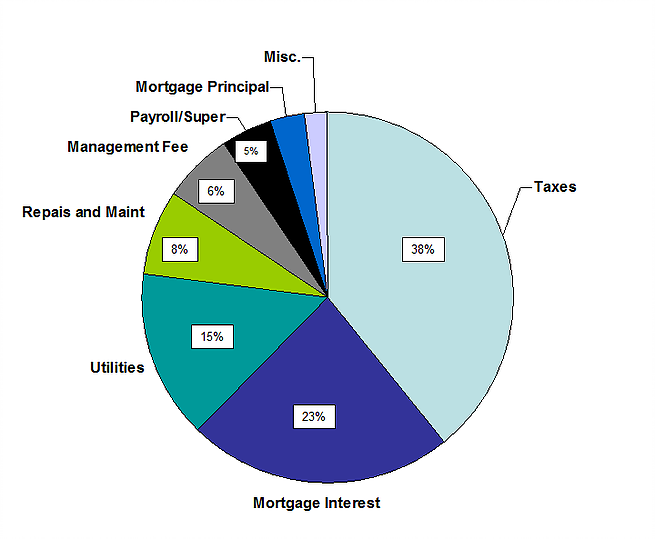
As we discussed in an earlier blog post, co-op maintenance charges in New York City can be expensive, causing many owners to wonder just where their money is going.
Many shareholders believe that trimming discretionary spending could result in significant savings and hold the line on increases. Unfortunately, about 90% of a co-op’s budget consists of fixed costs, with the largest portions allocated to real estate taxes and interest payments on the underlying mortgage.
Just take a look at a pie chart for one 40-unit non-doorman co-op with a live-in super.
Note that these budget items deal only with daily operating costs. Major repairs and capital improvements are typically paid from a co-op’s reserve fund, which a Board can replenish with an assessment.
The principal driver behind rising maintenance has been property tax increases. For the above building, the annual tax bill has increased over 45% in recent years from about $110,000 to over $160,000.
While co-op boards can retain an attorney to challenge their tax assessments, the savings realized are usually minimal.
Heating and water costs are also increasing. According to the New York City Department of Environmental Protection, water and sewer rates will increase 7.5% for 2012. Oil and natural gas prices, according to theU.S. Energy Information Administration, are also expected to climb steadily.
In addition to tax and operating cost increases, co-op buildings are also seeing revenue dry up. Buildings with commercial tenants are feeling the pinch of these economic times with losses of tenants and requests for rent reductions. If a building relied on flip taxes, it is likely struggling from the lower sale volume.
Some Boards have searched for alternative revenue sources. Converting extra basement space into rentable storage lockers is one popular method. A few years ago, one enterprising 17 story condominium on Queens Boulevard allowed risqué billboard advertisements to cover two of its facades. While the advertisements were illegal, and had to be removed, the revenue far exceeded the fines.
